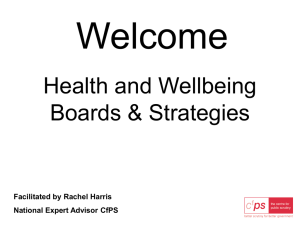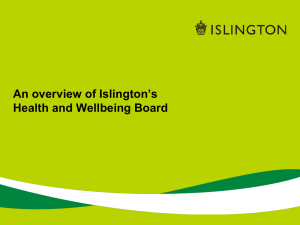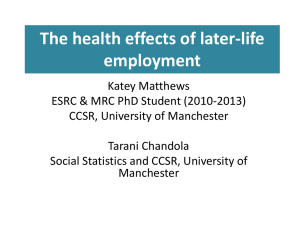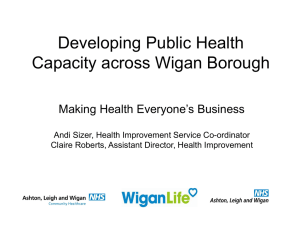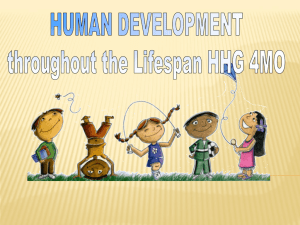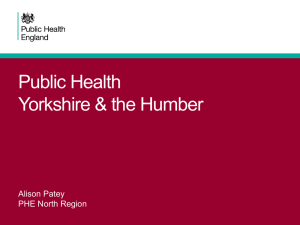AUKCE Presentation Wellbeing Coordinators EIF2
advertisement
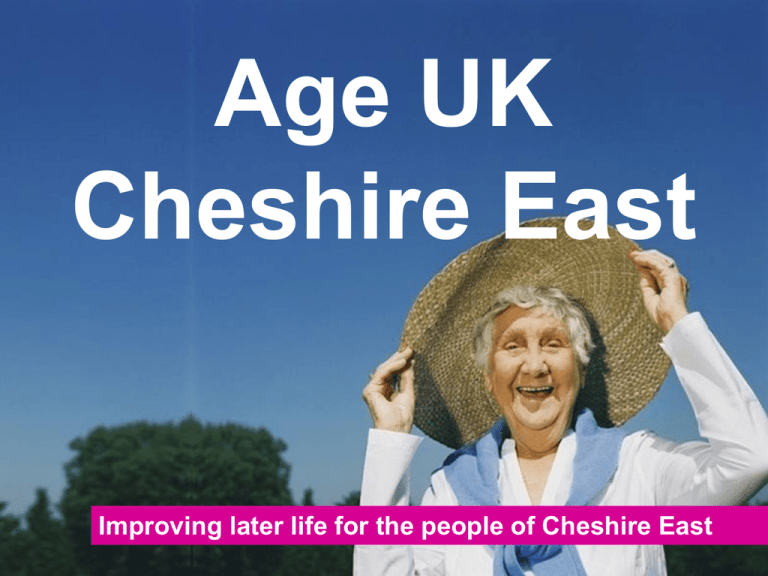
Age UK Cheshire East Improving later life for the people of Cheshire East Cheshire East Wellbeing Coordinators Dominic Anderson Deputy Chief Executive Age UK Cheshire East Local charity providing services around health and wellbeing, knowledge and practical support Work with people aged 50+ Won the IMPACT Award from King’s Fund in 2012 Objective to develop the role of the voluntary and community sector in implementation of Caring Together Cheshire East Cheshire East has the fastest growing ageing population in the North West - by 2033 more than 45% of the population will be over 50 years of age. * Life expectancy for males and females in Cheshire East is the highest in the North West and higher than the England average.* The number of people over 65 classified as being obese in Cheshire East is set to rise from 18,300 in 2010 to 26,900 in 2030.* The number of people aged over 50 with dementia living in Cheshire East is set to almost double by 2030, from 5,300 in 2009 to 9,100 in 2030.* * Ageing Well in Cheshire East Programme; A plan for people aged 50 and over 2012-17 (CECPCT2012) ‘Ageing Well in Cheshire East’ The Ageing Well Programme aims to ensure that services are planned in such away that they will continue to meet the needs of the population. Priorities include : making Cheshire East a place where, independence , wellbeing and participation of older people is supported and developed, * expanding the range of low-level prevention and early intervention services through partnerships with third sector organisations, (including volunteer and befriending services), * improving links between health and social care integrated teams, GPs and hospital services - integrating services and to coordinate better care. * * Ageing Well in Cheshire East Programme; A plan for people aged 50 and over 2012-17 (CECPCT2012) Wellbeing Coordinators Background to development with East Cheshire NHS Trust Role redesign project with Skills for Health Funding 5 Wellbeing Coordinators based with Caring Together Integrated Neighbourhood teams Wellbeing Coordinators A partnership between Age UK Cheshire East, East Cheshire NHS Trust, Eastern Cheshire, South & Vale Royal CCGs has developed the role of the Wellbeing Coordinators, in response to a number of priorities: to complement the Community Nursing Workforce Review and to develop a more prevention-oriented service to create a focus for health improvement within the newly established integrated neighbourhood teams to create pathways into voluntary and community sector services and support to enable people with long-term conditions to access brief interventions to support them to manage those conditions and reduce their reliance on health and social care services in the future Wellbeing Coordinators The role of the Wellbeing Coordinator: to support self-care for people with long term conditions assessment and review of individual needs build personal resilience in self managing their health and wellbeing development of individual wellbeing plans motivating behavioural change Wellbeing Coordinators Wellbeing Coordinators Evaluation – establishing a baseline Wellbeing parameters – this captures a range of health related data such as; weight, BMI, blood pressure, cholesterol, whether the client has diabetes, smokes, drinks alcohol, eats fruit and vegetables, has any allergies and medicine adherence. Wellbeing measures – this short questionnaire captures information relating to the client’s feelings and thoughts, their satisfaction and happiness with their life currently as well as a question relating to social trust Wellbeing Coordinators Evaluation – additional measures Reduction in GP visits for emotional issues Improvements in LTC parameters including things like reduction in BMI, reduction in insulin dependence etc. Reduction in unplanned hospital admissions Improvement in measures of wellbeing using patient questionnaires More effective discharge/reducing re-admissions Successes The increasing development of local service integration WBCs seen as ‘equal partners’ – input and work is valued and respected Numerous client achievements to date Flexibility to manage change Transferable role template Additional funding secured through Big Lottery Challenges Organisational change (community nursing review) Different levels of engagement Information Governance IT – access/non-compatible systems ‘Short term-ism’ Hints and Tips in Role Design Learn from other projects Take risks/action Review and make changes Communication is key It can be slow – a step at a time Focus on the outcomes Case Study Mr P, 80 year old gentleman who lives alone. Long-term conditions - heart failure and osteoarthritis. Referred from Community Heart Failure Nurse as he showed an interest in losing weight, but was finding it difficult due to his long term conditions. He did, however, understand that losing weight would greatly improve his symptoms. Case Study On the initial visit, the WBC spent time getting to know Mr P, and discussing his needs, goals, and his past attempts at losing weight Mr P told the WBC that he had had dealings with dieticians in the past, but that he did not find them particularly helpful. He said he would “dearly love to lose weight” but wasn’t sure how to go about it, short of “starving” himself. The WBC advised Mr P on the importance of eating a healthy, balanced diet, and taking part in regular physical activity, as evidenced in NICE Clinical Guidance (43) on Obesity, 2006. Case Study Interventions – food diary, seated exercise plan Mr P identified two short term wellbeing goals: To complete exercise plan three times per week, for four weeks To learn how to use the internet, particularly Skype, in order to keep in touch with family across the country Case Study Outcomes Increased physical activity – does home exercise programme every other day, swims twice a week, attends Tai Chi Increased fruit and vegetable consumption and lost 7 pounds Attended IT classes and bought a tablet to communicate with family Case Study Outcomes Reports improved mobility, general wellbeing and reduced breathlessness Feels part of the community Wider impacts on partner agencies Questions/ Discussion

